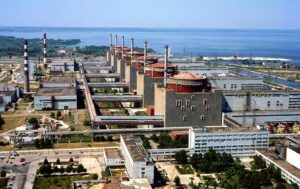
Ukraine has denied Director General of the International Nuclear Energy Agency (IAEA) Rafael Mariano Grossi a visit to the Russian-occupied Zaporozhye nuclear power plant until it is liberated, Energoatom reported.
“The Ukrainian side did not invite Grossi to visit ZNPP and previously denied him such a visit, stressing that a visit to the plant would be possible only when control over it was returned to our country,” Energoatom’s Telegram channel reported on Tuesday.
The message from Grossi that he received an invitation from Ukraine to visit the occupied ZNPP was called by the company another attempt to get to the plant by any means in order to legitimize the stay of the Russian occupiers there and, in fact, approve all their actions.
“There will be conclusions from the IAEA, such as “the plant continues to operate safely, the radiation background is normal, there are no radiation leaks, nuclear materials are kept safe, the Russian military and representatives of Rosatom take care of this, and there are no complaints against them,” Energoatom warns “.
At the same time, they explained the situation with the termination of the ZNPP online transmission of data to the agency on the state of affairs with nuclear materials, by which Grossi, in particular, explained the need for his visit.
“Loss of communication” between ZNPP and the IAEA was caused by the actions of the Russian invaders, who disconnected the Ukrainian operator Vodafone in Energodar, and the IAEA has a data transmission contract with Vodafone,” the NAEC described the situation.
At the same time, the company noted that all data collection points and servers that were under the control of the agency were closed and sealed. The information itself is accumulated on the server and will be transmitted when Vodafone is turned on.
“It seems very likely that it was the Russian side, by prior agreement with the IAEA, who made sure that the agency “lost control” without having access to this information, which means that the IAEA director general had a reason to come to the station,” Energoatom admitted.
In addition, they expressed the opinion that Grossi’s previous visits to Ukraine did not bring any benefit.
“Let us recall that on the way back after visiting the Pivdennoukrainsk NPP, he went to a meeting with the head of Rosatom, and together they reported to the world how good everything was at the Zaporozhye station,” the company stressed.
They also recalled that almost a quarter of the IAEA leadership consists of Russians, which casts doubt on the objectivity of its decision-making.
On June 6, Grossi tweeted once again that the IAEA was preparing an expert mission to the ZNPP, noting that it had stopped transmitting data, and referred to the invitation of Ukraine.
“Ukraine invited us, we will go there,” he wrote.
As reported, speaking at the opening of the meeting of the IAEA Board of Governors, Grossi called on the Board to support him in organizing a visit to the Zaporizhzhya NPP, and also noted that this issue needs UN support.
During the war, the IAEA carried out three expert missions in Ukraine – one to the Pivdennoukrainsk nuclear power plant and two to the Chernobyl nuclear power plant.